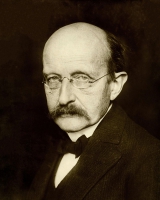| Max Karl Ernst Ludwig Planck | |
| 马克斯·卡尔·恩斯特·路德维希·普朗克 | |
| | |
Max Karl Ernst Ludwig Planck, ForMemRS (German: [ˈplaŋk]; English: /ˈplæŋk/; 23 April 1858 – 4 October 1947) was a German theoretical physicist whose discovery of energy quanta won him the Nobel Prize in Physics in 1918.
Planck made many contributions to theoretical physics, but his fame as a physicist rests primarily on his role as the originator of quantum theory, which revolutionized human understanding of atomic and subatomic processes. In 1948 the German scientific institution Kaiser Wilhelm Society (of which Planck was twice president) was renamed Max Planck Society (MPS). The MPS now includes 83 institutions representing a wide range of scientific directions.
